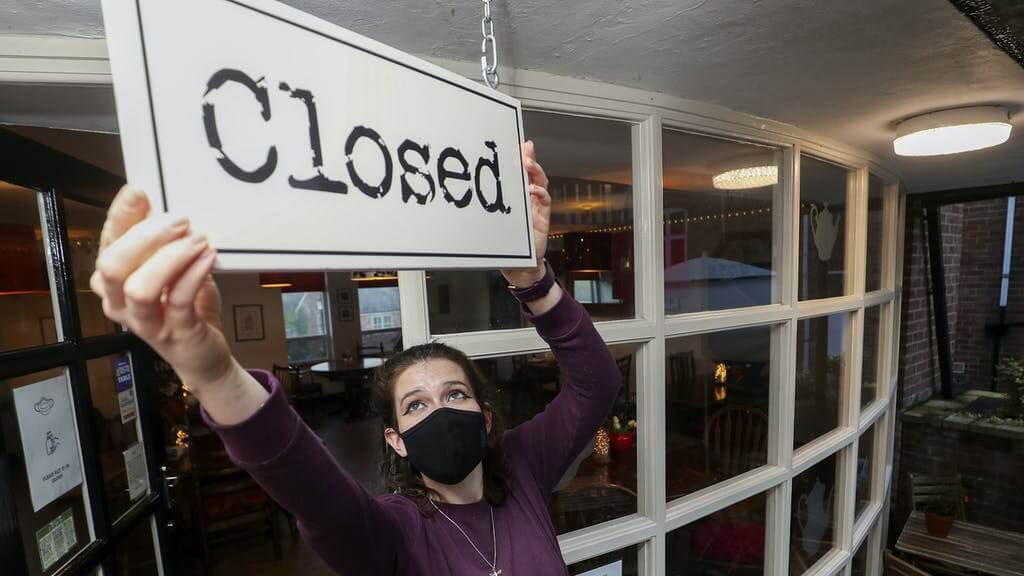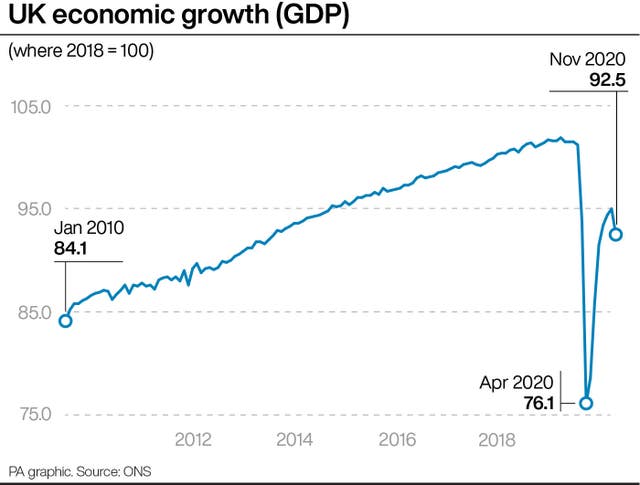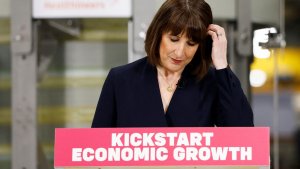UK Heads Towards Double-Dip Recession As GDP Falls 2.6%
GDP at the end of the month was 8.5% below its pre-pandemic peak and is expected to fall further.

The UK economy is on track to head back into recession as official figures showed that it fell in November after the country was hit by stricter coronavirus restrictions.
The Office for National Statistics (ONS) said UK gross domestic product (GDP) declined by 2.6% month-on-month in November.
GDP at the end of the month was 8.5% below its pre-pandemic peak but is expected to fall further after a third lockdown took hold this month.
November’s decline came after six consecutive months of growth, with a 0.6% improvement in October.

The latest figure was ahead of the forecasts of analysts, who had predicted a 4.6% decline for November.
Economists had warned that the UK is set to see a double-dip recession if restrictions remain in place in the first three months of 2021.
The services sector shrank by 3.4% in November as rafts of hospitality and leisure firms were forced to shut due to England’s second lockdown and strict restrictions across the other home nations.
The sector is now 9.9% smaller than it was in February 2020, before the impact of the pandemic was first fully felt.
Construction grew by 1.9% during the month as its recovery continued, while the production sector shrank by 0.1%, according to the new figures.
Darren Morgan, director for economic statistics at the ONS, said: “The economy took a hit from restrictions put in place to contain the pandemic during November, with pubs and hairdressers seeing the biggest impact.
“However, many businesses adjusted to the new working conditions during the pandemic, such as widespread use of click and collect as well as the move online.
“Manufacturing and construction generally continued to operate, while schools also stayed open, meaning the impact on the economy was significantly smaller in November than during the first lockdown.
“Car manufacturing, bolstered by demand from abroad, housebuilding and infrastructure grew and are now all above their pre-pandemic levels.”
Activity remains at 2014 levels, and output is 8.5% down compared with February.
So this remains a *huge* recession.
And the direction of travel is bleak: with even tighter restrictions coming into force at the start of 2021, a 'double dip' recession looks inevitable. pic.twitter.com/RNlC5YRaVI
— JamesSmithRF (@JamesSmithRF) January 15, 2021
Jeremy Thomson-Cook, chief economist at Equals Money, said: “The UK economy contracted in November as the country slowly slipped back into the lockdowns that have been a feature of life since then and through the Christmas period.
“The services sector remains the hardest hit, and naturally the most valuable to the UK economy as a whole.
“Given conditions were lighter in November – lower tiers, more businesses able to trade at some level – today’s numbers confirm that Q4 2020 will be the first quarter of the new double-dip recession.”
James Smith, research director of the Resolution Foundation, said: “The sharp GDP fall in November as England entered its second national lockdown suggests that the UK is in the midst of a double-dip recession as it starts the year with even stricter restrictions.
“But while the economic story today is of only the second-ever double-dip recession on record, the story of the year will be a vaccine-driven bounce back in economic activity for sectors like hospitality and leisure.
“The Chancellor must do everything he can to support that recovery once public health restrictions ease.”
Thanks for signing up to Minutehack alerts.
Brilliant editorials heading your way soon.
Okay, Thanks!

